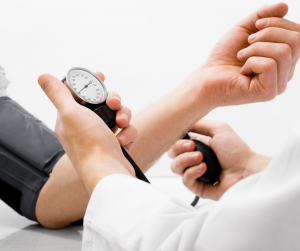High Blood Pressure and how to reduce it

High blood pressure and how to reduce it
Blood pressure is the force exerted on artery walls as the heart pumps blood through the body. High blood pressure, also called hypertension, is blood pressure that is higher than normal. Your blood pressure changes throughout the day based on your activities. Having blood pressure measures constantly above normal may result in a diagnosis of high blood pressure (or hypertension). ![]() This article on ‘high blood pressure and how to reduce it’ aims to explain exactly what this condition is and what causes it. Additionally, this article explores how to reduce hypertension, and consequently reduce the risk of other associated health risks.
This article on ‘high blood pressure and how to reduce it’ aims to explain exactly what this condition is and what causes it. Additionally, this article explores how to reduce hypertension, and consequently reduce the risk of other associated health risks.
You can have high blood pressure for years without symptoms. Uncontrolled high blood pressure increases your risk of serious health problems, including heart attacks and strokes. High blood pressure affects an estimated 1.13billion people worldwide and less than 1 in 5 have it under control (WHO). It was estimated by Public Health in Ireland that by 2020 one quarter of the Irish population or more than 1.2 million adults would have high blood pressure (publichealth.ie).
What is high blood pressure?
Blood pressure is determined by the amount of blood your heart pumps and the level of resistance to blood flow in your arteries, the major blood vessels in the body. The more blood your heart pumps and the narrower your arteries, the higher your blood pressure. A blood pressure reading is given in millimetres of mercury (mm Hg). It has two numbers:
- The top number is known as systolic pressure and measures the pressure in your arteries when your heart beats or contracts.
- The bottom number is known as diastolic pressure and it measures the pressure in your arteries when your heart is more relaxed between beats
As a general guide:
- High blood pressure is 140/90mmHg or higher
- Low blood pressure is 90/60mmHg or lower
- Ideal blood pressure is somewhere between 90/60mmHg and 120/80mmHg
Why does it increase your risk of having a stroke?
Hypertension puts all of the body’s arteries under strain, including those leading to the brain. Being under strain makes it more likely a blood vessel in the brain could weaken and bleed or develop a blockage. As a result, both of these could cause a stroke. One in six people will have a stroke at some point in their life and yet only half of the people with high blood pressure know that they have the condition.
Other health dangers associated with high blood pressure
High blood pressure not only puts extra strain on the arteries (blood vessels) but also on the heart and other organs, such as the brain, eyes and kidneys. Untreated hypertension can increase the risk of serious and potentially life-threatening conditions such as;
- Heart disease
- Heart attacks
- Aneurysms
- Strokes
- Kidney disease
- Dementia (vascular)
- Peripheral arterial disease
Risk Factors
There are a number of factors which are outside of your control which can increase your risk of developing high blood pressure
- Age – the risk of high blood pressures increases as you age, over 65’s would be of increased risk.
- Race – it is particularly common among people of African heritage.
- Family history – high blood pressure tends to run in families.
However, the good news is that if you have this condition, reducing it even a small amount can help lower your risk. Risk factors which you have control over include:
- Too much salt in your diet
- Too little potassium in your diet
- Not doing enough exercise
- Being overweight or obese
- Not being physically active
- Drinking too much alcohol, coffee or other caffeine-based drinks
- Smoking
- Stress
- Getting too little sleep or very disturbed sleep
- Certain chronic conditions e.g., diabetes
- Pregnancy
High blood pressure is more common in adults; however, children can be at risk too if they have problems with their heart or kidneys. Worryingly, for a growing number of children, poor lifestyle habits, such as an unhealthy diet and lack of exercise is now contributing to high blood pressure.
What are the symptoms?
Hypertension is called a “silent killer”. Most people with hypertension are unaware of the problem because it may have no warning signs or symptoms. Therefore, it is essential that blood pressure is measured regularly by a health professional.

When symptoms to occur, then can include irregular heart rhythms, vision changes, buzzing in the ears, nosebleeds and early morning headaches. Severe hypertension can cause confusion, anxiety, chest pain, fatigue, vomiting and muscle tremors.
Reducing the risk of hypertension
It is possible to reduce your chances of developing hypertension, or lowering your pressure if it is already high, by making healthy lifestyle changes.
- Eating a healthy diet
- reduce salt (to less than 5g daily)
- more fruit and vegetables
- limit foods high in saturated fats
- eliminating/reducing trans fats
- Maintaining a healthy weight
- Being physically active
- Not smoking
- Limiting alcohol
About us
Donegal Safety Services provides this information for guidance and it is not in any way a substitute for medical advice. Donegal Safety Services is not responsible or liable for any diagnosis made, or actions taken on this information.
Donegal Safety Services provide a number of first aid training courses, if you have any questions at all regarding any of our courses we would be delighted to hear from you. You can contact us by visiting our contact us page or by emailing us directly on info@donegalsafetyservices.ie
Hope you enjoyed this article on high blood pressure and how to reduce it.